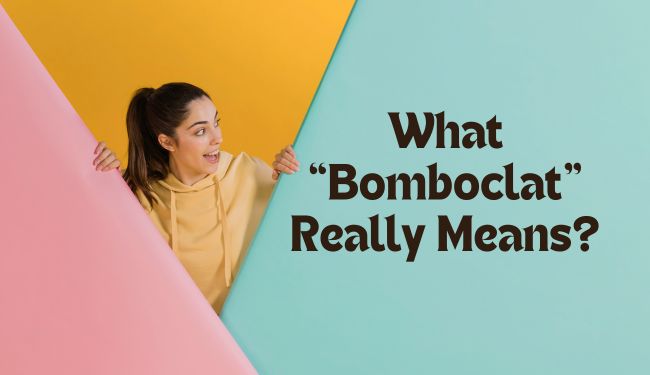Language lives in funny ways. A word bursts out of a community, grows wild on social media, mutates, gets chewed up, spit out again, and suddenly, people all across the world are typing it without really knowing what it means.
One of those words? Bomboclat. The internet couldn’t get enough of it for a while, and even now, it drifts in conversations, meme captions, and Twitter threads.
But here’s the deal: the meaning is way deeper than a random online trend. Let’s unravel it.
Where the Word ‘Bomboclat’ Came From
First things first, Bomboclat isn’t a fresh internet word. It’s a Jamaican Patois word. The roots go back to claat, a dialect version of “cloth,” often meaning menstrual cloth or toilet paper. It sounds crude – because it is.
Jamaicans use it as a curse word, an expletive you don’t toss casually in polite company. The “bombo” part? It roughly translates to “bottom” or “bum.” Put them together, and you get a raw, explosive insult that packs way more punch than a simple “damn.”
In Jamaica, if someone throws “bomboclat” at you, it’s no joke. It’s offensive, powerful, and tied to emotion. Think of it like the way English speakers throw around the F-word, except with heavier cultural weight. So when Twitter grabbed hold of it, the original sting blurred into something else entirely.
Why It Became a Meme
So how did a fierce Jamaican curse word end up plastered across Twitter timelines with cat pictures? Around 2019, “Bomboclat” became a meme format.
Users would post an image with “bomboclat” as the caption, and everyone else would respond with phrases that match the vibe. Imagine posting a photo of spaghetti in a sneaker, captioning it “bomboclat,” and replies flood in: “wrong turn at dinner,” “art project gone bad,” “don’t ask questions.”
It shifted from an insult to a prompt. Almost like “explain this” or “what’s this?” That transformation is the internet doing its usual thing: pulling a word out of its roots and remixing it into entertainment.
People who had never even heard Jamaican Patois adopted it, stripped of its bite, tossed it around playfully. That’s how memes spread—strangeness gets recycled until the meaning bends.
The Real Jamaican Context
Here’s where things get messy. In Jamaica, bomboclat is no lighthearted joke. It’s one of the “claat” family of cuss words: bomboclat, rassclaat, bloodclaat, pussyclaat. All nasty, all loaded with cultural baggage.
You might shout it when you’re angry, shocked, or just trying to unleash raw frustration. The word can be so intense that it sometimes substitutes for raw emotion itself. Imagine smashing your toe on the corner of the bed – you yell “Bomboclat!” That sort of heat.
What’s important is context. Jamaicans use it with layers of rhythm, tone, cultural familiarity. Outsiders tossing it around online rarely understand that.
For many Jamaicans, seeing “bomboclat” go viral as a meme felt off – like watching something serious turn into a punchline. It’s a reminder that internet slang often hides histories beneath its glossy surface.
How “Bomboclat” Differs From “Bumbaclaat”
You’ve probably noticed people typing it differently: bomboclat, bumbaclaat, bumboclaat. Are these all the same? Pretty much. The spellings vary because Jamaican Patois doesn’t have one strict written form.
It’s oral, rhythmic, lived. So when people transliterate, letters shift. “Bumbo” and “bombo” are phonetic variations, but both hit the same nerve. Don’t get confused if you see it spelled in different ways – the meaning stays raw and consistent.
Internet Slang vs. Cultural Reality
Here’s the fascinating split: on the internet, bomboclat became playful shorthand. In Jamaica, it stays vulgar and heavy. This tension mirrors what happens with lots of slang words when they leave their birthplace.
Online audiences love to borrow language because it feels edgy, exotic, or just funny to them. But sometimes, that borrowing wipes away the weight of the original.
When people in Kingston hear “bomboclat,” it might start a fight. When a Twitter user in Los Angeles posts “bomboclat” under a picture of SpongeBob, it sparks laughs. Same letters, two wildly different impacts. That’s how globalization and meme culture remix language.
Should You Use It?
Tricky question. If you’re not Jamaican, throwing “bomboclat” into your daily speech might land awkwardly. It can sound like cultural appropriation – using someone else’s culture for a quick joke without respecting the depth behind it. Jamaicans often find it jarring when outsiders use their curses loosely.
That said, if you’re quoting the meme, most people online will take it as part of internet culture, not a literal curse. But if you’re traveling in Jamaica? Think twice. You don’t want to blurt “bomboclat” at the wrong moment and spark hostility. Best to appreciate the word, understand its origins, but keep it in context.
Related Words You Should Know
Since bomboclat belongs to the “claat” family, here are a few cousins worth mentioning:
- Rassclaat – Similar sting, with “rass” meaning backside.
- Bloodclaat – Refers to menstrual cloth, one of the strongest curses.
- Pussyclaat – Pretty self-explanatory, combining genital reference with “claat.”
Each word follows the same rhythm: raw, bodily, visceral. These words aren’t just random swears; they carry history, culture, emotion. They’re tied to Jamaica’s way of expressing shock, anger, or emphasis.
What Makes It Stick?
Why did bomboclat, out of all Patois words, climb the meme ladder? Probably the sound. The word is explosive—literally starts with “bomb.”
It looks funny on screen, feels heavy in the mouth, and for non-Jamaicans, mysterious enough to be intriguing. Language with punchy syllables often goes viral because people like the feel of saying or typing it.
Plus, memes love ambiguity. “Bomboclat” doesn’t translate neatly. So people filled the gap with creativity, which made the format thrive. The less people understood, the more flexible it became.
Also Read:

